- Home
- David Brin
The Transparent Society Page 4
The Transparent Society Read online
Page 4
Those same opponents then turn around and file suit to force release of proprietary company documents—for the public good, of course—seeking to widen the particular spigot that they choose.
These issues will all be discussed later. I am not making value judgments at this point, only noting a consistent pattern that will help us explore why we often take one-sided positions, self-righteously demanding far more openness from our opponents than we want applied to ourselves.
Matters of privacy, accountability, and freedom are often judged first and foremost on the basis of whose ox is being gored.
In the following chapters, I use a catch-all phrase, “strong privacy advocates,” to label those who are most outspoken against “transparency.” From the start, let me state that this term oversimplifies a wide range of groups and individuals. For instance, many ACLU members do not share the generalized antipathy toward government that is a common premise of “cypherpunk” activists like Hal Finney and Tim May. Although liberals and libertarians both see themselves staunchly combating dire threats to freedom, they often find themselves vigilantly facing in opposite directions.
As we’ll see later, the prescriptions proposed by those I put in this camp also cover a wide range. For instance, some groups like the ACLU lobby for new legislation to prevent misuse of private data by corporations and snooping government agencies. This is sometimes called the “European model,” since members of the European Union have been extremely active in setting up rules and regulations to govern who has the right to collect, withhold, or control the use of personal information. At one extreme of this trend are those who demand legal recognition that individuals have a basic right of ownership over any and all data about themselves: no one should be able to use any fact or datum concerning you—not even your name—without your explicit permission.
Supporting a quite different approach are some of the most vivid and original thinkers of the information age. John Gilmore, Esther Dyson, John Perry Barlow, and others on the (roughly) libertarian wing were in the vanguard fighting against both the Clipper proposal and the Communications Decency Act. Seeing little need or value in new laws, they hold that technology will be a key factor in defending liberty during the coming era. Fresh tools of encryption and electronic anonymity will protect individuals against intrusive spying by others, and especially by the state. What they demand, therefore, is that government stand back and not interfere as a myriad anonymous personae and enciphered secrets throng across the dataways.
Taking this attitude to far greater extremes are the “anarcho” libertarians, such as financier Walter Wriston, who take pleasure in predicting a virtual end to all government, opening an age of unbridled and anonymityshrouded individualism.
Straddling the cypherpunks and lobbyists are some of the newer online privacy groups, for example, EPIC and the Center for Democracy and Technology, which support crypto-technologies while still seeking to influence laws and regulations, a mix that sometimes leaves them seeming to pull in two directions at once. Others, like the Privacy Rights Clearinghouse (PRC), emphasize a strictly pragmatic approach. A book by PRC project director Beth Givens offers copious practical advice about how “little guys” can use today’s legal protections to take some control of their credit ratings, their medical records, or whether their names will proliferate endlessly across countless irritating mailing lists.
This short compilation leaves out many other players, but it is enough to illustrate a single trait shared by all, the belief that modern concerns about freedom and privacy can often be solved by some specific or general reduction in the flow of information, or by making the stream flow in just one direction. Whether they advocate new laws, technologies, or practical savvy, each would empower people and groups to conceal things. For want of a better term, “strong privacy” will have to do.
In fact, I admire many of these advocates for their intelligence, passion, and concern. We would all be a lot worse off if they weren’t out there, pitching their ideas.
In some cases, they are probably right.
But there is another side to the issue. One that needs to be heard.
OTHER VOICES
I am not the only one speaking for transparency, the notion that we may all benefit by carefully increasing two-way information flows. In addition to the names mentioned earlier in this chapter, some others should be noted.
Jack Stack, already a business legend for transforming his manufacturing company from red ink to splendid profitability, hit best-seller lists in the mid-1990s with his book The Great Game of Business: Unlocking the Power and Profitability of Open-Book Management, in which he advocates letting all of a company’s employees view the ledgers. By welcoming input and oversight from every level, he claims, managers profit from a much wider pool of criticism and good ideas. This doesn’t mean giving up executive authoriy, but it does engender in staff at all levels a sense of personal identification with team success—even when the “team” consists of several thousand employees. Stack’s simple argument shrugs aside all theory. He makes no pretensions to ideology. His basis for open-book management is pragmatic. It works in good times, and especially well in hard times. It is a formula for success.
Unfortunately, as we’ll see in chapter 5, it takes maturity and willpower for any kind of authority figure to loosen the reins of control, even when doing so clearly serves the greater good. Despite the popularity of his book, Stack is swimming against powerful currents of human nature.
On the other hand, didn’t I just spend the first half of this chapter implying that transparency is inevitable?
Late in this book, we’ll examine whether any single scenario about tomorrow seems compellingly likely. Personally, I think the jury is still out. But there is one celebrated author who contends that our fate has already been decided. According to cartoonist-humorist Scott Adams, we are destined for a world of universal vision, whether we like it or not. In The Dilbert Future, Adams offers a look at the next century that is at once both earnest and bitingly sardonic. Exploring many of the same themes as this book—for instance, the notion that professional news reporters will be replaced by swarms of amateurs with cameras—Adams takes into account likely breakthroughs such as ubiquitous video, DNA matching, and cybernetic scent-bloodhounds before reaching the following conclusion: “In the future, new technology will allow the police to solve
100 percent of all crimes. The bad news is that we’ll realize 100
percent of the population are criminals, including the police.”
Adams then makes the hilarious extrapolation that every human on the planet will eventually land in jail for minor crimes, except the world’s smartest person who, since she was too clever to get caught, must thereafter bear the tax burden of supporting everyone else in prison, forever. Like Mark Twain and other great humorists, Adams uses outrageous exaggeration to raise serious issues—in this case how we may respond when our smallest peccadilloes become public knowledge. Will we become a society of frantic finger-pointers and blamers? Or might we learn to “chill out” when everyone realizes that people who live in glass houses are unwise to cast stones?
At the opposite end of the “seriousness” spectrum from Adams, we find Dartmouth physicist Arthur Kantrowitz and philanthropist-investor George Soros, who have taken up the cause Karl Popper championed a generation ago and are campaigning that an “open society” is healthiest when it lives up to its name. Both men have been vigorous in promoting the notion that free speech and transparency are not only good but absolutely essential for maintaining a free, creative, and vigorous civilization.
Kevin Kelly, executive editor of Wired magazine, expressed the same idea with the gritty clarity of information-age journalism: “The answer to the whole privacy question is more knowledge. More knowledge about who’s watching you. More knowledge about the information that flows between us—particularly the meta-information about who knows what and where it’s going.”
In other wo
rds, we may not be able to eliminate the intrusive glare shining on citizens of the next century, but the glare just might be rendered harmless through the application of more light aimed in the other direction. Nor is Kelly alone in this opinion among cyber-era luminaries. Even some of the bright people I labeled earlier as “strong privacy advocates”—Esther Dyson and John Perry Barlow, for instance—have publicly mused that transparency might be preferable, if only it could somehow be made to work. Said Barlow: “I have no secrets myself, and I think that everybody would be a lot happier and safer if they just let everything be known. Then, nobody could use anything against them. But this is not the social norm at the moment.”
If transparency is the requisite condition in science, democracy, and free markets, it should come as no surprise that economists—who work at the nexus of all three—find openness appealing. Many economists now lean toward attributing most kinds of injustice, bureaucracy, and societal inefficiency to asymmetric information flows—where one person or group knows something that others don’t. Pick an institution, and these economists will talk about how the structure was chosen in response to some information-related problem. When they examine causes of “market failures” (things that make simple markets handle problems poorly) these experts list uneven knowledge right at the top. Other reasons, such as lack of complete competition, inability to commit, public goods, and externalities, would be relatively easy to fix, via either contracts or politics, if we all had symmetric information.
“In that case,” says Robin Hanson, an economist at the University of California, Berkeley, “we’d each know how much we expect to gain or lose in a change. We could negotiate such changes in ways that made everyone feel better off than before.”
Hanson cites the following familiar problems: war, caused by one side guessing wrong about the other’s power or determination; lack of trade, often due to buyers’ unwillingness to admit how much they want something; going to trial, like war, attributed to misreading what the other side would settle for; law enforcement, costly and overbearing because the police don’t know who did what crimes; status consumerism, buying visible but less valuable goods to show others that we can; the collapse of mutually beneficial negotiations, being afraid that someone else knows something we don’t, and if they agree to a proposal, it must be because it favors them in some way we haven’t realized; monopoly, causing losses because the monopolist can’t discriminate price perfectly and charge each person what it’s worth to them; and rat races, working too hard to convince employers that we really want success. All of these problems arise because of limited or restricted information flows. With improved knowledge on all sides, many governmental and nongovernmental organizations might lose their purpose, lose their constituencies, and possibly fade away.
Caltech professor John O. Ledyard points out that “asymmetric information conveys a monopoly position on the holder of the information that markets cannot easily overcome.”
Although they generally favor transparency, economists warn that information flows should be opened up evenly, lest one side or another gain unfair advantage during the transition—a gradualist approach that is supported throughout this book.
Finally, there are groups and individuals who believe in action, rather than words, and providing the tools of transparency to those who need it most. For example, the Witness Program donates video equipment and training to human rights groups around the world, from Nigeria, Rwanda, and Bosnia to Guatemala and Haiti. According to Witness cofounder Peter Gabriel, “a camera in the right hands at the right time can be more powerful than tanks or guns. Let truth do the fighting.” Other groups concentrate on U.S. inner cities, helping create neighborhood watch programs to combat both crime and unprofessional police practices. Meanwhile, Transparency International fights corruption by promoting open legal and business practices around the world.
All of these efforts are aimed at making things better by increasing, rather than decreasing, the flow of information and forging a path into the future that takes advantage of light, as if the right to see will be as vital tomorrow as the right to bear arms was yesterday. Nevertheless, they would have little chance of success without help from powerful social forces. Chapters 5 and 6 look at some trends in our strange, quirky civilization that lean strongly toward rambunctious openness. If transparency is not “inevitable,” at least we are bound for interesting times.
THE CONCERNS OF NORMAL PEOPLE
Theory is fine, but in the long run society’s course will be determined by regular folks, whose concerns strike close to home. Here are some of the apprehensions expressed by people who have written to me.
Is my boss recovering and reading all my deleted e-mail messages at work? Is my supervisor metering my coffee breaks?
Will my medical records be shared with every insurance company and every employer I submit an application to? Might my neighbors somehow snoop the records of my therapist?
I’m worried about my dossier, kept by some secretive credit bureau. How will reciprocal transparency protect me from the countless databases that already have my name and Social Security number?
Can “openness” ever work both ways—applying equally against the powerful—in a world that’s suddenly filled with cameras?
Finally, there is the message I received from one woman reflecting a somewhat different perspective. I don’t care so much about privacy. What have I got to hide that would interest anybody? And even if they did learn everything about me, why should I care? No, what bothers me is the same kinds of things that fret most of the people I know. My family’s safety, with crime all over. Not knowing or having any say in what’s happening each day to my kid in school, if he’s being beaten up or offered drugs. If I’m being robbed by the companies and politicians, or if some maniac is going to swerve around the next corner at ninety and splatter my brains. We live in “gated-community” prisons, afraid of strangers, afraid to let our kids play in the street. Ask me what I’d trade, to have these worries lifted off of me!
All our fancy social speculations won’t matter if we can’t address the concerns of people like this, who feel beleaguered enough to talk about “trading” something for more security, or a little less fear. Later, we’ll talk more about this notion of trade-offs, one of the most insidious, troubling logical fallacies of our day, the widely held idea that danger is a price we all must pay for freedom. For now, let me just say that I won’t exchange my liherty—or anyone else‘s—for security. I surely won’t give up essential privacy: of home, hearth, and the intimacy that one shares with just a few.
But that is a far cry from maintaining a so-called right to skulk in shadows and act against others anonymously—a fictitious right that shelters nearly all the predators who make this a wary, suspicious age, fueling both the growth of government and a rising obsession with personal safety.
Suspicions that may snuff out the bright hopes of a coming “infotopia.”
So much for practicing what I preach: letting the reader know what to expect. I’ll close this introductory chapter now with a final thought.
It is hard for recent cave dwellers to transform themselves into
smart, honest, and truly independent creatures of light.
For millennia, philosophers have told us we could do it by willing ourselves to behave better, through faith, or by obedience to strict codes of conduct. Those prescriptions never worked well, not all by themselves, and they proved almost useless at thwarting truly malignant men bent on harming others. But now, at last, we seem to have hit on a pragmatic tool more in keeping with our ornery natures.
Accountabiliy.
All right, it still has some kinks to work out. We cave folk are new at this sort of thing—just a few centuries along the road of democracy, and only decades exploring diversity as a paramount virtue.
It’s unclear, as yet, how far this road will take us. Nevertheless, one fact should grow apparent soon.
We’ll all stumble a lot l
ess if we can see where we are going.
THE END OF PHOTOGRAPHY AS PROOF OF ANYTHING AT ALL
There was once a kingdom where most people could not see. Citizens coped with this cheerfully, for it was a gentle land where familiar chores changed little from day to day.
Furthermore, about one person in a hundred did have eyesight! These specialists took care of jobs like policing, shouting directions, or reporting when something new was going on. The sighted ones weren’t superior. They acquired vision by eating a certain type of extremely bitter fruit. Everyone else thanked them for undergoing this sacrifice, and so left the task of seeing to professionals. They went on with their routines, confident in a popular old saying.
“A sighted person never lies.”
One of the scariest predictions now circulating is that we are about to leave the era of photographic proof. For generations we relied on cameras to be the fairest of fair witnesses. Images of the Earth from space helped millions become more devoted to its care. Images from Vietnam made countless Americans less gullible and more cynical. Miles of footage taken at Nazi concentration camps confirmed history’s greatest crimes. A few seconds of film shot in a Dallas plaza in November 1963 set the boundary conditions for a nation’s masochistic habit of scratching a wound that never heals.
Although there have been infamous photographic-fakes—trick pictures that convinced Sir Arthur Conan Doyle there were real “fairies” and Mary Todd Lincoln that her husband’s ghost hovered over her, or the ham-handedly doctored images that Soviet leaders used to erase “nonpersons” from official history—for the most part scientists and technicians have been able to expose forgeries by magnifying and revealing the inevitable traces that meddling left behind.

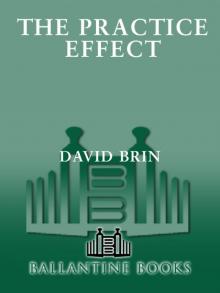 The Practice Effect
The Practice Effect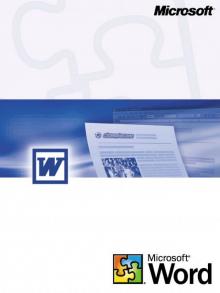 Infinity's Shore
Infinity's Shore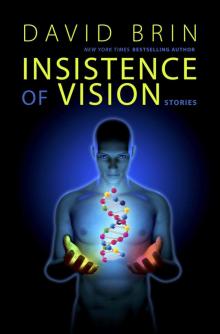 Insistence of Vision
Insistence of Vision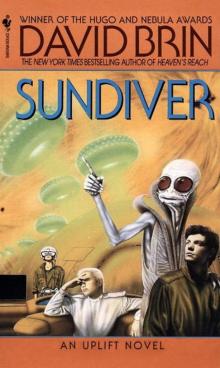 Sundiver
Sundiver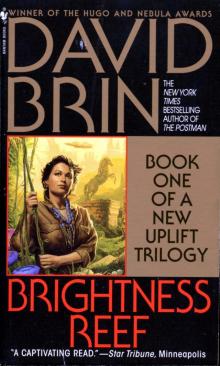 Brightness Reef
Brightness Reef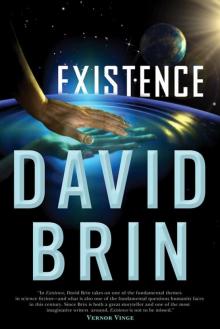 Existence
Existence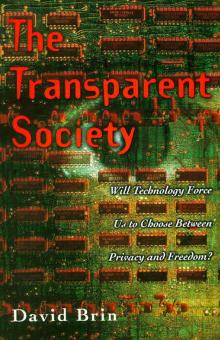 The Transparent Society
The Transparent Society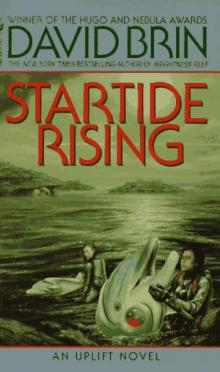 Startide Rising
Startide Rising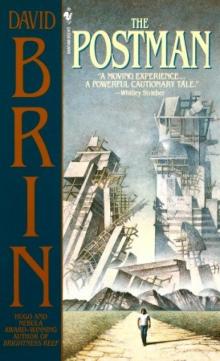 The Postman
The Postman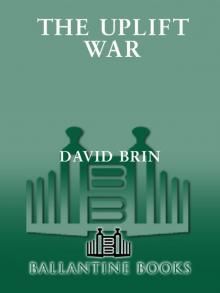 The Uplift War
The Uplift War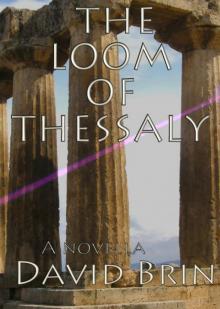 The Loom of Thessaly
The Loom of Thessaly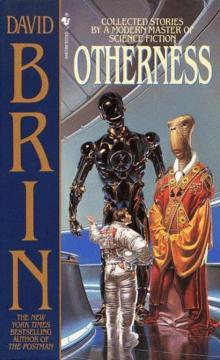 Otherness
Otherness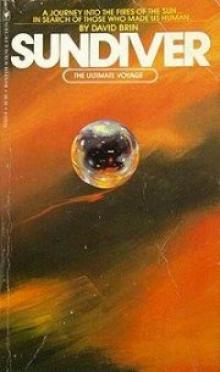 Sundiver u-1
Sundiver u-1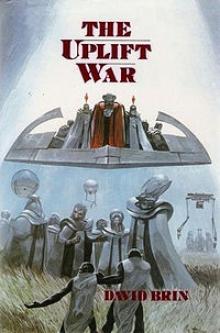 The Uplift War u-3
The Uplift War u-3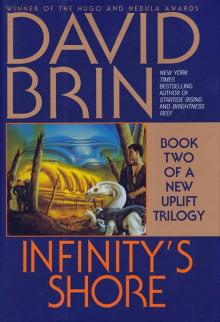 Infinity's Shore u-5
Infinity's Shore u-5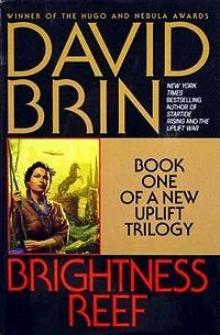 Brightness Reef u-4
Brightness Reef u-4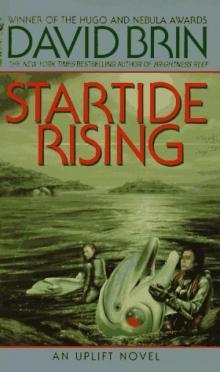 Uplift 2 - Startide Rising
Uplift 2 - Startide Rising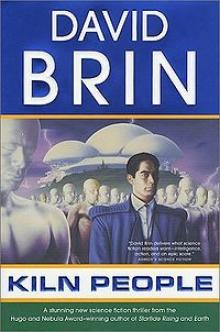 Kiln People
Kiln People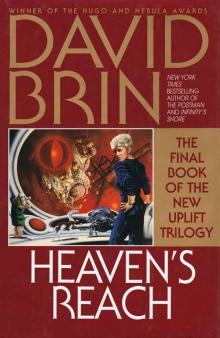 Heaven's Reach u-6
Heaven's Reach u-6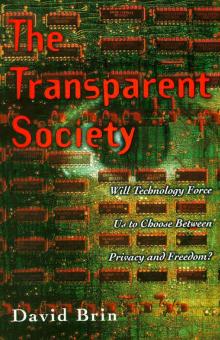 The Transparent Society: Will Technology Force Us to Choose Between Privacy and Freedom?
The Transparent Society: Will Technology Force Us to Choose Between Privacy and Freedom?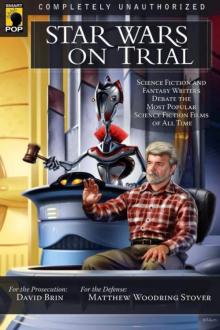 Star Wars on Trial
Star Wars on Trial Lungfish
Lungfish Tank Farm Dynamo
Tank Farm Dynamo Just a Hint
Just a Hint A Stage of Memory
A Stage of Memory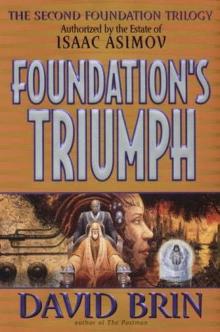 Foundation’s Triumph sf-3
Foundation’s Triumph sf-3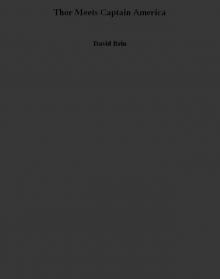 Thor Meets Captain America
Thor Meets Captain America Senses Three and Six
Senses Three and Six The River of Time
The River of Time Chasing Shadows: Visions of Our Coming Transparent World
Chasing Shadows: Visions of Our Coming Transparent World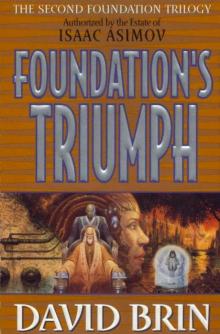 Foundation's Triumph
Foundation's Triumph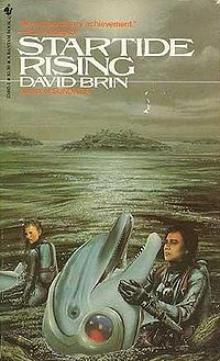 Startide Rising u-2
Startide Rising u-2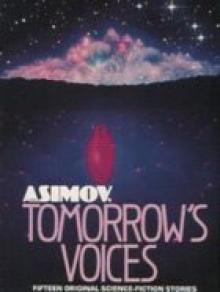 The Fourth Vocation of George Gustaf
The Fourth Vocation of George Gustaf The Heart of the Comet
The Heart of the Comet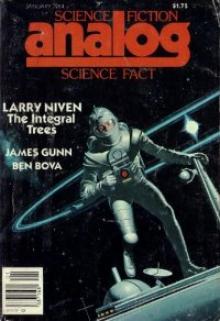 The Crystal Spheres
The Crystal Spheres